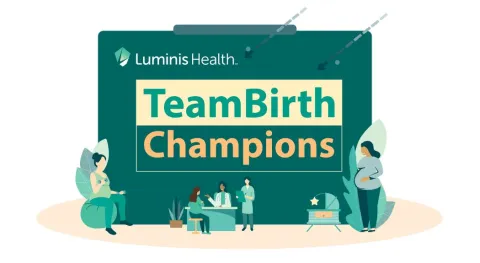by Luminis Health

Welcoming your newborn can be an exhilarating experience. It can also trigger powerful emotions, from excitement to unease. For many expectant parents, it can trigger unanticipated feelings of depression or anxiety.
Most new parents will experience some form of the ‘baby blues,’ which may include mood swings, crying, sadness and difficulty sleeping. These symptoms typically last a few days and resolve on their own. However, some new parents will have a more severe, longer-lasting mood disorder known as postpartum depression or anxiety.
What is postpartum depression?
Postpartum depression (PPD) and postpartum anxiety (PPA) occur after having a baby. About 40 percent of those with PPD first develop these symptoms during pregnancy. About one in nine people who have given birth experience symptoms of PPD in the United States, according to CDC research. Symptoms usually develop by six weeks postpartum but may develop anytime during the first year. If left untreated, PPD can last for years.
PPD is common and often associated with adverse infant and maternal outcomes, such as lower breastfeeding initiation and duration, poor maternal and infant bonding, and possible long-term cognitive impairment and abnormal child development.
Although rare, an extreme mood disorder called postpartum psychosis may develop after childbirth and, if left untreated, may lead to suicide or infanticide. Symptoms of postpartum psychosis require immediate evaluation and treatment.
Who’s at risk of PPD?
PPD can happen to anyone. It’s not only dependent upon physical changes, such as a dramatic drop in hormones, post-birth or a genetic predisposition. Emotional issues may also trigger PPD, especially when you’re sleep deprived or overwhelmed. Other external factors that can prompt PPD include financial worry, relationship problems, absent support system or a traumatic birth experience, among others. Those who have preexisting mental health disorders are at an increased risk of developing PPD or PPA.
What preventative steps can I take during and after pregnancy?
PPD can last anywhere from weeks to months. If left untreated, symptoms could be prolonged. There are several things you can do to help prevent PPD during and after pregnancy:
- Take care of your health. Eating healthy, sleeping eight or more hours per night, exercising and taking a prenatal vitamin can help improve symptoms. As a new parent, you’re sleep deprived and your focus is your baby. However, in order to take care of your baby, you have to take care of yourself, too.
- Talk to your partner and support network. If those close to you know something is off, they can offer more support and, if necessary, help encourage you to seek professional help from a licensed counselor or psychiatrist.
- Develop healthy coping mechanisms. Listening to music, developing a hobby and exercising can help you develop healthy coping habits.
- Talk to your provider. Reach out to your midwife, nurse practitioner or doctor. Know that there are medications that are safe during pregnancy and while breastfeeding.
- Use your resources. Joining local parent groups – whether on social media or a community group – can offer additional support with others who are going through the same thing.
If at any point you have suicidal thoughts or thoughts of harming your baby, seek immediate help from your partner or loved ones in taking care of your baby and call 911 to get help.
Don’t forget, PPD and PPA are very common and you have done nothing to cause it. You shouldn’t feel ashamed or guilty.
It’s also important for you to feel safe enough to talk with your provider about how to alleviate symptoms. There is help out there and you don’t have to suffer through it alone.
To learn more or to schedule an appointment with Luminis Health Midwifery Annapolis, call 443-481-4400.



